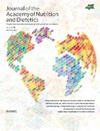The Dietetics Profession Privilege Scale: Development, Psychometric Testing, and Application Among a Diverse Cohort of Dietetics Professionals
IF 3.5
2区 医学
Q2 NUTRITION & DIETETICS
Journal of the Academy of Nutrition and Dietetics
Pub Date : 2024-09-20
DOI:10.1016/j.jand.2024.09.005
引用次数: 0
Abstract
Background
Privilege (defined as the unearned advantage or disadvantage experienced by social groups resulting from structural power differences) impacts efforts to create a diverse and inclusive dietetics profession. Yet, no current measures exist to assess and observe privilege, and the relative privilege among dietetics professionals (DPs) is unknown.
Objective
The purpose of this study was to develop and validate a scale to measure DP privilege and to use that scale to assess privilege among a sample of DPs in the United States.
Design
The initial scale was developed by the research team and the psychometrics were assessed using a 3-phase cross-sectional study exploring construct, content and face validity, and test–retest reliability.
Participants/setting
A survey with content experts (n = 18), cognitive interviewees (n = 12), and a survey of DPs (n = 900) were conducted online and over Zoom during 2021.
Statistical analyses
Exploratory factor analysis, 1-way analysis of variance, Cronbach’s α, and descriptive statistics were used to assess the final instrument and identify correlates of privilege.
Results
Findings indicate that the 29-item Dietetic Profession Privilege Scale has good validity and reliability across 6 domains (ie, treatment in training, identity alignment, resource access, cultural access, financial access, and physical access). The mean (SE) privilege score among the current sample of DPs was 45 (10.2) out of 58 points, with the greatest gaps between racial and ethnic groups, where White DPs (n = 540) had a mean (SE) score of 49.7 (0.33), followed by a mean score of 41.0 among Middle Eastern/North African DPs (n = 9); mean score of 40.0 for the Native Hawaiian and Pacific Islander–identifying DP; mean (SE) score of 39.8 (0.93) among DPs with 2 or more racial or ethnic identities, including White (n = 68); mean score of 35.7 among DPs with 2 or more marginalized racial or ethnic identities (n = 6); a mean (SE) score of 35.3 (1.07) among Black or African American DPs (n = 51); a mean (SE) score of 34.3 (0.93) among Asian DPs (n = 67); a mean (SE) score of 33.4 (0.91) among Latino, Hispanic, and Chicano DPs (n = 71); and a mean (SE) 29.4 (3.42) among American Indian and Alaskan Native DPs (P < .001 for all racial and ethnic groups in which n > 10; SE not indicated for groups when n < 10). DPs with dominant group identities were found to have statistically higher privilege scores than their peers with marginalized identities in several areas, including race, gender, sexual orientation, income, socioeconomic status, neurodivergence, and ableness, and scored higher on the privilege scale than their peers with marginalized identities.
Conclusions
The Dietetics Profession Privilege Scale is a valid and reliable scale that demonstrates the ability to distinguish differences in privilege between DPs in the interest of reducing bias and achieving inclusion, diversity, equity, and access with the profession.
饮食营养学专业特权量表:在饮食营养学专业人员中进行开发、验证和应用。
背景:特权(定义为社会群体因结构性权力差异而经历的非应得的优势或劣势)影响着创建多元化和包容性营养学专业的努力。然而,目前还没有评估和观察特权的措施,营养学专业人员的相对特权也不得而知:本研究的目的是开发并验证一个衡量营养学专业特权的量表,并使用该量表对美国营养学专业人士的特权进行评估:设计:研究小组开发了初始量表,并通过三阶段横断面研究对心理测量学进行了评估,探讨了结构效度、内容效度、表面效度和重测信度:/设置:2021年期间,对内容专家(18人)进行了调查,对认知受访者(12人)进行了访谈,对营养学专业人士(900人)进行了调查:采用探索性因子分析、单向方差分析、克朗巴赫α和描述性统计来评估最终工具并确定特权的相关因素:研究结果表明,由 40 个项目组成的饮食营养专业特权量表在六个领域(培训待遇、身份一致性、资源获取、文化获取、经济获取和物质获取)具有良好的有效性和可靠性。当前样本中营养学专业人员的特权平均分为 45 分(满分 58 分,SE=10.2),种族/族裔群体之间的差距最大,其中白人营养学专业人员(DPs)(n=540)的平均分为 49.7 分(SE=0.33),其次是中东/北非裔营养学专业人员(n=9)的平均分为 41.0 分,夏威夷原住民/太平洋岛民身份的营养学专业人员的平均分为 40.0 分,有两个或两个以上身份的营养学专业人员的平均分为 39.8 分(SE=0.93)。在具有两种或两种以上种族/族裔身份(包括白人)的民主党人(人数=68)中,得分为 39.8(SE=0.93);在具有两种或两种以上边缘种族/族裔身份的民主党人(人数=6)中,得分为 35.7;在黑人/非洲裔民主党人(人数=51)中,得分为 35.3(SE=1.07);在黑人/非洲裔民主党人(人数=51)中,得分为 34.3(SE=0.93)。3(SE=0.93),拉美裔、西班牙裔和奇卡诺裔民主党人中为 33.4(SE=0.91)(n=71),美国印第安人/阿拉斯加原住民民主党人中为 29.4(SE=3.42)(P10;SE 不表示 n 的组别):营养学专业特权量表是一个有效、可靠的量表,能够区分营养学专业人员之间的特权差异,从而减少偏见,实现专业的包容性、多样性、公平性和可及性。
本文章由计算机程序翻译,如有差异,请以英文原文为准。
求助全文
约1分钟内获得全文
求助全文
来源期刊

Journal of the Academy of Nutrition and Dietetics
NUTRITION & DIETETICS-
CiteScore
7.20
自引率
10.40%
发文量
649
审稿时长
68 days
期刊介绍:
The Journal of the Academy of Nutrition and Dietetics is the premier source for the practice and science of food, nutrition, and dietetics. The monthly, peer-reviewed journal presents original articles prepared by scholars and practitioners and is the most widely read professional publication in the field. The Journal focuses on advancing professional knowledge across the range of research and practice issues such as: nutritional science, medical nutrition therapy, public health nutrition, food science and biotechnology, foodservice systems, leadership and management, and dietetics education.
 求助内容:
求助内容: 应助结果提醒方式:
应助结果提醒方式:


